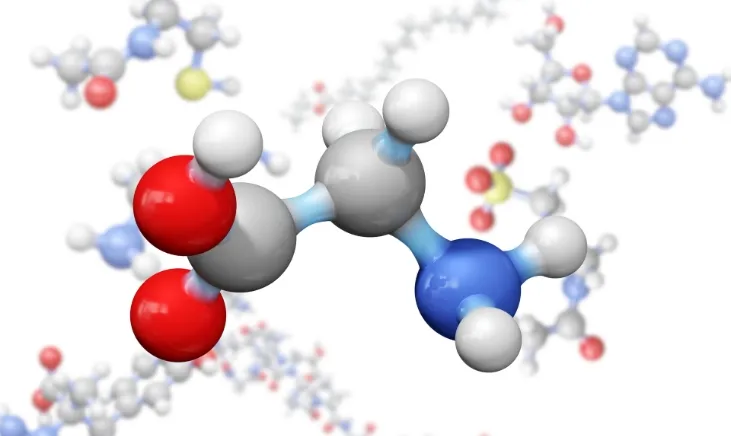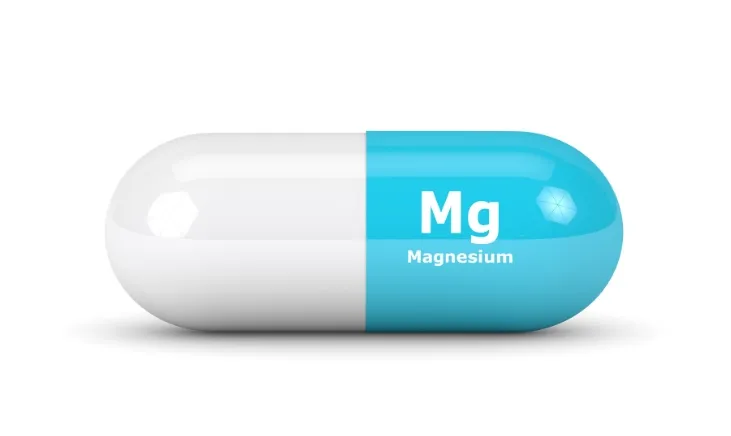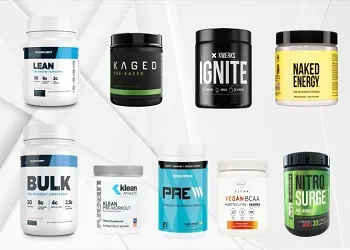Glycine, glycinate—same thing, right? While these two supplements are very similar, they are not the same. In this article, we discuss what glycine and magnesium glycinate are, as well as how they are similar and how they are different.
Table of Contents
Short Summary
- Glycine is an amino acid that contributes to muscle and bone structure; heart, brain, and nerve function; and good quality sleep.
- Magnesium glycinate is the mineral magnesium combined with the amino acid glycine. It is needed to produce energy within the human body, as well as form our DNA and bones. It also keeps our muscles and heart functioning optimally.

What Is Glycine?
Glycine is an amino acid with many important functions within our bodies. It is considered a nonessential amino acid because our bodies can make it if we do not consume sufficient amounts of glycine rich foods in our diet. Choline, serine, hydroxyproline, and threonine are other compounds used to produce glycine in our liver and kidneys.
Why Do We Need Glycine?
Glycine serves many purposes within our bodies.
As you now know, glycine is one of the nonessential amino acids. Amino acids are the building blocks of protein and are needed for protein synthesis. Glycine contributes to muscle growth and increased strength as a component of creatine. Glycine is also a key part of collagen, a structural protein that is needed for the health of our joints, connective tissue, bones, muscles, ligaments, and skin.
Glycine is also important for many other organs including our hearts, brains, and nerves. Glycine helps keep our bodies healthy, by acting as an antioxidant and reducing the risk for type 2 diabetes.
Finally, recent research has shown glycine helps promote better sleep quality.
Glycine vs Glycinate
You may find yourself wondering, is glycinate the same as glycine? The answer is both yes and no. Glycine is the name for the amino acid itself. Glycinate is the name for the amino acid when it is connected to another substance. While they refer to the same amino acid, one is free while the other is bound.
One example of glycinate is magnesium glycinate, which is glycine connected to magnesium.

What Is Magnesium?
Magnesium is a mineral found both in our bodies and in many foods we eat. Magnesium has many functions within our bodies so adequate magnesium intake is important for optimal health. Some individuals also choose to take a magnesium supplement for a variety of health reasons.
Why Do We Need Magnesium?
Magnesium plays a role in many processes necessary to keep us alive and well.
Magnesium is required for energy metabolism within our bodies. It is also needed to transport a variety of nutrients, including calcium and potassium, into our cells.
Additionally, magnesium is needed to form our DNA and RNA. It is also part of the structure of our bones and is necessary for important functions like transmitting nerve impulses and contracting our muscles, including our heart muscle. Without magnesium our hearts would stop beating.
Magnesium Deficiency
Magnesium deficiency can develop if you do not consume enough magnesium in your diet regularly. However, it is uncommon to develop a deficiency solely from not eating enough magnesium rich foods. More often, a magnesium deficiency is a result of another health problem, a side effect of a medication, or associated with chronic alcohol abuse.
Symptoms of magnesium deficiency include:
- Loss of appetite
- Nausea
- Vomiting
- Fatigue
- Weakness
- Numbness
- Tingling
- Muscle contraction issues
- Muscle cramps
- Seizures
- Personality changes
- Abnormal heart rhythms
Taking a magnesium supplement can help raise your magnesium levels, improve your magnesium status, and reverse magnesium deficiency.

Magnesium Supplementation
Taking magnesium supplements is common. However, there are many types of magnesium supplements, and each has slightly different benefits.
As you now know, magnesium is extremely important for optimal health. Many people choose to take a magnesium supplement to boost their intake of this essential mineral. However, there are many different types and choosing the right one for you can help ensure you get the results you are looking for.
Magnesium Citrate
Magnesium citrate is one of the most popular supplemental forms of magnesium. As its name implies, magnesium citrate is a combination of magnesium and citric acid.
Magnesium citrate is easy to absorb and often used to replenish low magnesium levels associated with a magnesium deficiency. High dose magnesium citrate supplements provide a laxative effect and are frequently used to treat constipation.
Magnesium Oxide
Magnesium oxide is magnesium combined with oxygen. This form of magnesium is not well absorbed by the GI tract and does not do much to help increase magnesium levels in cases of magnesium deficiency. However, magnesium oxide is often used to soothe digestive issues including heartburn, indigestion, and upset stomach.
Magnesium Glycinate
Magnesium glycinate is simply a combination of magnesium and glycine. While there are many forms of magnesium, this specific combination is a popular one for many reasons.
First, magnesium glycinate is highly bioavailable, meaning it is very easy for our bodies to absorb. It is also often taken as a sleep aid and/or to help promote relaxation because both magnesium and glycine have these effects on the body.

Glycine vs. Magnesium Glycinate
Glycine and magnesium glycinate both contain glycine. As their names suggest, the only difference is the presence of magnesium in magnesium glycinate. So you may be wondering, are glycine and magnesium glycinate the same thing?
Is Glycine the Same as Magnesium Glycinate?
No, not exactly. While you will receive the same benefits from the glycine in both compounds, you will likely receive some additional benefits from the magnesium in magnesium glycinate.
When to Take Glycine
Glycine has many benefits, many of which we discussed above. Supplementing with glycine may be beneficial to:
- Increase muscle growth
- Improve muscle strength
- Promote bone health
- Strengthen joints and ligaments
- Improve cardiovascular health
- Boost brain health
- Improve nerve function
- Balance blood sugar
- Promote restful sleep
When to Take Magnesium Glycinate
Magnesium glycinate also has many important functions that supplementing may enhance including:
- Reducing anxiety
- Enhance muscle function
- Improve bone formation
- Maintain heart health
- Balance blood sugar
- Improve PMS symptoms
- Facilitate better sleep
Can You Take Glycine and Magnesium Together?
So, if both supplements have great benefits, you may be asking yourself, can I take magnesium glycinate and glycine together? In theory, yes, you can. However, make sure to be smart about your supplement regimen.
It’s uncommon to over supplement with glycine. However, it is possible and can be toxic in high doses. As with most supplements, more is not always better. Following the recommended serving suggestions and discussing with your doctor, registered dietitian, or another healthcare provider can help you identify the ideal amount of each supplement for you.
Summary
Glycine is a nonessential amino acid with a wide variety of important functions within our bodies. Magnesium glycine is glycine bonded to magnesium and also plays many key roles in the human body. While both compounds are similar, they are not exactly the same. Knowing what each supplement does can help you determine if you supplement with one, both, or neither.

Frequently Asked Questions
Are magnesium and glycine good for sleep?
Yes, magnesium is known to promote relaxation and a sense of calm. It has also been shown to help support sleep. Glycine has also been shown to improve sleep quality. Both compounds are beneficial for high-quality, restful sleep.
Who should not take magnesium glycinate?
Supplementing should always be discussed with your doctor, registered dietitian, or another healthcare provider. However, in general, individuals with the following health conditions are cautioned against taking magnesium glycinate:
Diabetes
Heart conditions
Liver disease
Kidney problems
Digestive system issues
Alcohol dependence
Pregnancy
Breastfeeding
What are the risks of taking glycine?
In general, supplementing with glycine is fairly low risk. However, some individuals have reported digestive disturbances including nausea, vomiting, and/or diarrhea after taking glycine supplements.
Additionally, as previously mentioned, over-supplementing can result in toxicity. Discuss your dosage with your healthcare provider.
Is it OK to take glycine every night?
Yes, current data does not caution against taking glycine daily. Again, be sure you are taking an appropriate dosage at appropriate intervals, and not over-supplementing. This is best done by discussing your supplement regimen with your healthcare provider.














